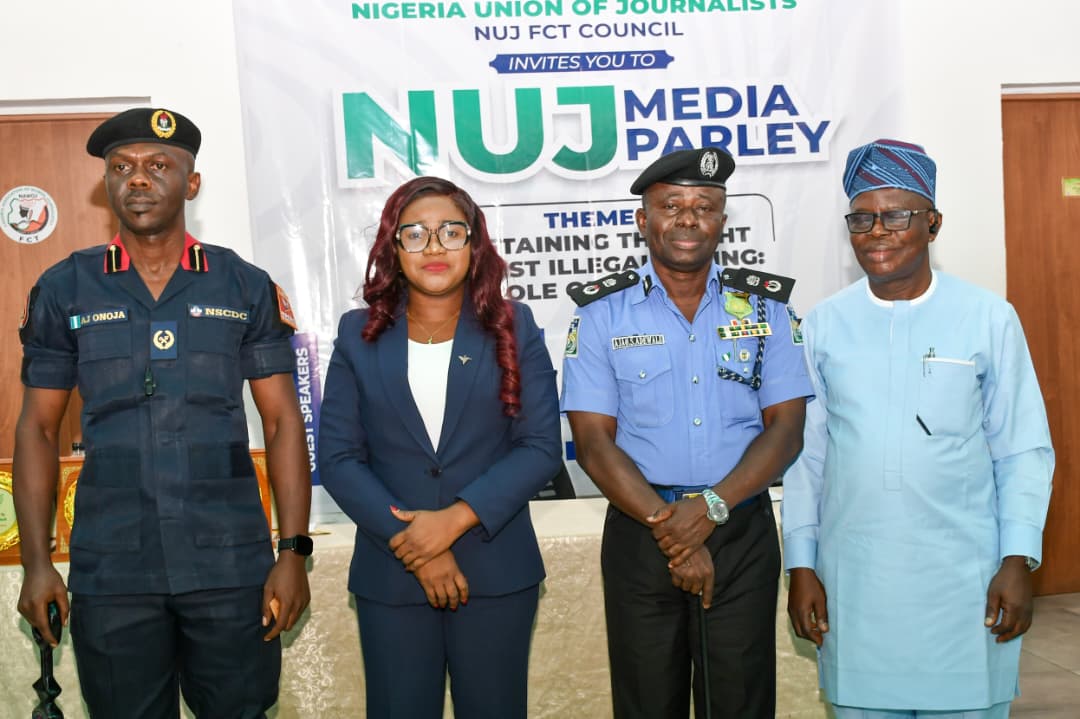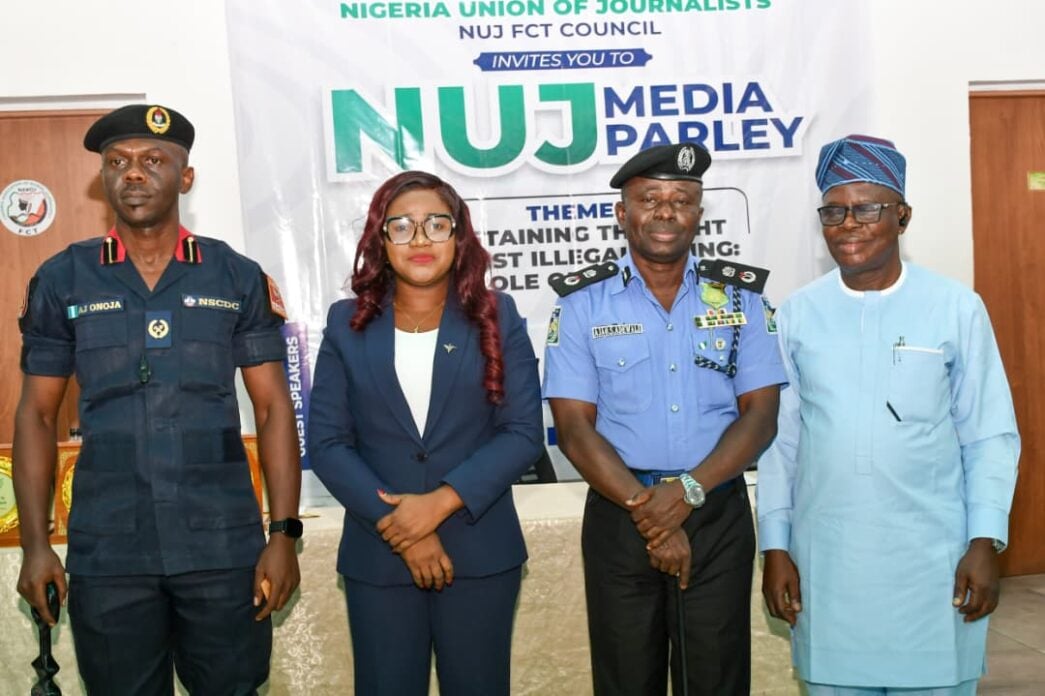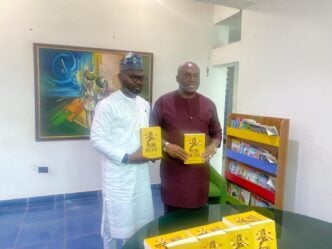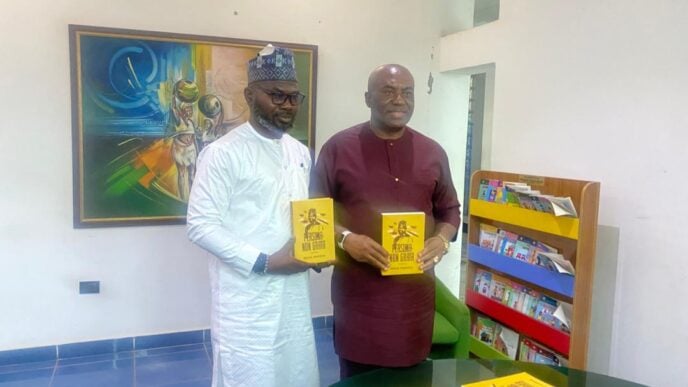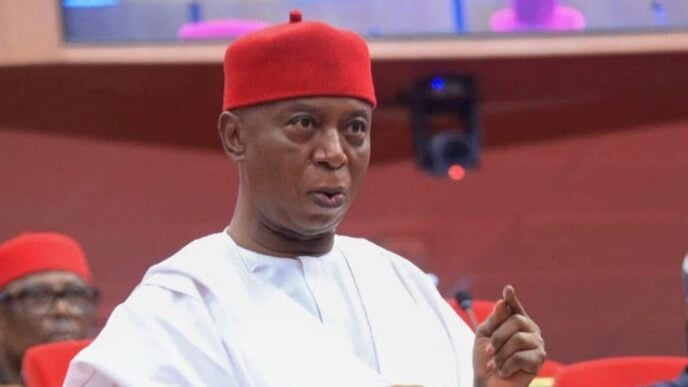L-R: Attah Onoja, NSXDC commander of mining marshals' unit; Grace Ike, FCT NUJ chairperson; Ajao Adewale, FCT police commissioner; Dele Ayanleke, president of the Miners Association of Nigeria
Ajao Adewale, commissioner of police in the federal capital territory (FCT), says illegal mining is robbing Nigeria of its resources while empowering cartels.
Adewale spoke in Abuja on Wednesday during a workshop organised by the FCT chapter of the Nigeria Union of Journalists (NUJ) themed, ‘The Fight Against Illegal Mining: Role of the Media’.
Adewale said illegal mining fuels insecurity, degrades the environment, undermines lawful investment, and “robs the nation of vital resources”.
“Its consequences often spill into banditry, communal clashes, and environmental disasters that weaken the social fabric of our communities,” he said.
Advertisement
Citing data from the Nigeria Extractive Industries Transparency Initiative (NEITI), the police commissioner said Nigeria loses an estimated $9 billion annually to illegal mining/gold smuggling.
“Illegal mining has been directly linked to insecurity and the rise of violent crimes such as banditry, kidnapping and armed conflict, especially in states like Zamfara, Katsina, Niger and parts of FCT,” he said.
“This is due to the struggle for control of mineral resources, a funding source of bandits, weak law enforcement and corruption.
Advertisement
“A global definition of organised criminal mining underscores that when criminal groups control mining at scale, especially in remote, unmonitored areas, the operations resemble cartel-like behaviour.
“In Nigeria’s context, these networks may exhibit coordinated control over land, extraction and smuggling.
“There are reports of powerful Nigerians behind illegal mining and funding insecurity. The minister of solid minerals development, Dele Alake, has pointed to powerful Nigerians as the primary drivers of illegal mining, noting the use of foreigners merely as fronts.”
He stated that there have been reported cases of illegal mining in Gwagwalada, Asokoro, Gaube, Kuje, and Katampe Extension in the FCT.
Advertisement
Citing media reports, the police commissioner said 72 suspects were arrested by the National Security and Civil Defence Corps (NSCDC), police, and Economic and Financial Crimes Commission (EFCC) between 2023 and 2024.
“Illegal mining robs Nigeria of its wealth, fuels insecurity, and empowers criminal cartels. But with the resolve of the security agencies and the vigilance of the media, this menace can be defeated,” he said.
The police commissioner called for collaboration between journalists and the security agencies to tackle illegal mining.
A. J. Onoja, NSCDC assistant commander of the corps and commander of the mining marshals, said illegal mining has inflicted devastating harm on Nigeria’s economy, environment, and security.
Advertisement
Onoja said illegal mining is costing the country billions in lost revenue while destabilising communities.
He explained that the mining marshals were set up “to protect our mineral resources, restore order, and ensure that mining becomes a genuine driver of sustainable national development”.
Advertisement
Onoja said the mining marshals’ unit is not a typical task force but an elite enforcement arm of the NSCDC created under existing laws to combat fraud and illegal exploitation of mineral resources.
Dele Ayanleke, national president of the Miners Association of Nigeria, described illegal mining as the unauthorised extraction of minerals—such as gold, lithium, tin, and sand—without the necessary permits, licences, or compliance with environmental and safety regulations.
Advertisement
Ayanleke warned that it drains government revenue, discourages investors, displaces communities, and fuels environmental damage.
He explained that the practice persists due to poverty, unemployment, corruption, and weak governance, emphasising that short-term crackdowns are insufficient.
Advertisement
“Sustained efforts are needed to keep the public and authorities informed, ensure enforcement remains consistent, protect communities and the environment, and foster long-term policy changes,” Ayanleke said.
Grace Ike, NUJ FCT chairperson, said beyond reporting, journalists must investigate, expose, and educate the public on the devastating effects of illegal mining, particularly on communities and water resources.
The NUJ chairperson urged journalists to leverage digital platforms responsibly, partner with experts and authorities, and uphold professionalism in their work.
